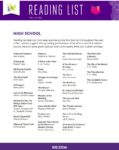One of the earliest memories I have is of my dad reading The Trumpet of the Swan to me. My parents and older siblings often read to me, and I had a collection of picture books that would make any librarian swoon. But the time that stands out most is when my dad sat next to my bed and read aloud from a chapter book.
To say I love to read is an understatement, and without a doubt that love stems from the value that was placed on reading as I was growing up. However, reading aloud to your children does more for them than just building great memories and fostering a love for reading. It improves reading, writing, speaking, listening, and attention. Reading aloud to your children provides a model of what good reading looks and sounds like, builds vocabulary, and it improves comprehension.
Let’s take a closer look at each of these benefits:
Reading aloud to your child provides a model of what good reading looks and sounds like.
When you read aloud to your child, he or she can hear what a fluent reader should sound like. A fluent reader uses the proper pace, the right tone, and an appropriate volume, based on the words on the page. For example, “Liz exclaimed, “Woo hoo!” as her teammate crossed the finish line and won first prize. “Field Days were the best!” would be read very differently from “Liz whispered, ‘it’s okay, little guy,’” to the whimpering puppy. She snuggled him closer and they both went to sleep.” With the proper pace, tone, and volume, the first sentence would be read a little faster, a bit more jovial, and a lot quieter than the second sentence. Hearing these differences read aloud helps young readers’ vocabulary and comprehension, too.
Reading aloud to your child builds vocabulary.
Reading the phrase “Liz exclaimed, ‘Woo hoo!’” with the right tone and volume helps build an understanding of the word exclaimed, and reading the phrase “Liz whispered, ‘it’s okay, little guy’…” with the right tone and volume helps build and understanding of the word whispered. Even the youngest of listeners can grasp the difference between exclaimed and whispered when presented with this read-aloud experience.
Reading aloud to your child improves writing, speaking, and listening.
Students learn a great deal of vocabulary from simply listening. The more words they’re exposed to, the more words they’ll learn. Reading aloud exposes students to an even wider variety of words, many of them more difficult than they are capable of reading. Soon, you’ll notice your child using these new words when he or she speaks or writes.
Reading aloud to your child improves comprehension.
When you read aloud to your child, you’ve both experienced the story and so you both can talk about the story. Who were the characters you liked the best? Who were the characters you liked the least? What happened in the story? Has anything like that ever happened to you? By talking to your student about what was read, you help build comprehension. Additionally, many parents read aloud to their children but pause to add questions they think of or point to particular words or pictures in the story. Drawing attention to details in this way helps students look for them on their own later. The best way to improve ones’ reading and comprehension is to read often.
Reading aloud to your child improves attention.
Anything you read can work as a read-aloud—books, magazines, newspapers, even textbooks.. That said, it’s a great idea to read books and stories that will capture and hold your student’s attention. Involve the family and take turns selecting both picture books and chapter books. You’ll be pleasantly surprised to see even the most blasé teenager crack a smile when a favorite picture book is read aloud again!
Finally, strive to read aloud to your children every day. No matter the age, the experience is one that will benefit everyone.
Resources for parents
Jim Trelease’s Read-Aloud Handbook
http://www.trelease-on-reading.com/
Reading is Fundamental Reading Aloud to Your Child: The Loving, Personal Gift
Reading Rockets Ten Things You Can Do to Raise a Reader
http://www.readingrockets.org/article/49468






















































































































